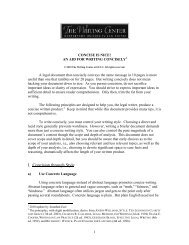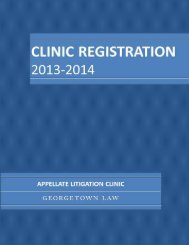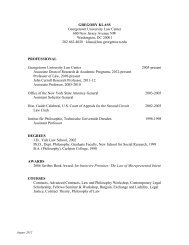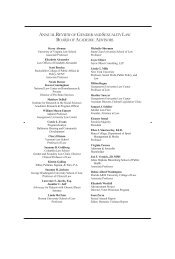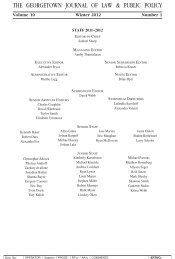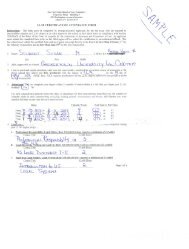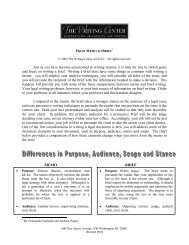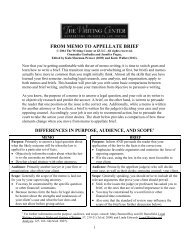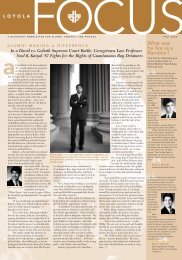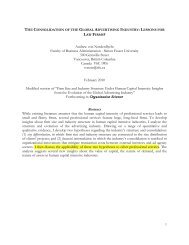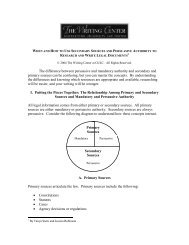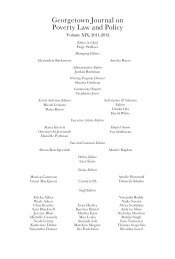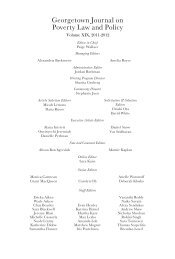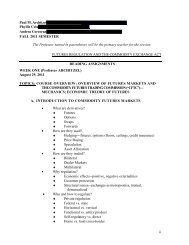Date: April 12, 2013 Topic: The Shrinking ... - Georgetown Law
Date: April 12, 2013 Topic: The Shrinking ... - Georgetown Law
Date: April 12, 2013 Topic: The Shrinking ... - Georgetown Law
You also want an ePaper? Increase the reach of your titles
YUMPU automatically turns print PDFs into web optimized ePapers that Google loves.
legal services based upon data aggregation, concluding with several recommendations for<br />
the profession drawn from the travel industry’s experience. Part I of the paper provides<br />
an overview of the travel industry’s response to the Internet-boom during the 1990’s,<br />
comparing the legal profession’s reaction at that time and suggesting six lessons that law<br />
can learn from travel. Part II then examines emerging models and markets for legal<br />
services, offering three case studies: (1) the emergence of legal process outsourcing and<br />
data-driven procurement in American big law; (2) LegalZoom as first-mover in the<br />
online, do-it-yourself legal services market; and (3) Riverview <strong>Law</strong>’s new model for<br />
business representation in the wake of the UK Legal Services Act. Part III concludes that<br />
in order to thrive in the wake of the shrinking pyramid, lawyers, like travel professionals,<br />
must begin engaging in more deliberate innovation to preserve opportunities for the<br />
application of complex judgment, while simultaneously leveraging the advantages of<br />
online technology and complex data analysis. Our article offers a unique perspective on<br />
these issues, drawing from the authors’ varied backgrounds—collectively we represent<br />
two law schools and three industry innovators in the new legal marketplace.<br />
Part I: Six Lessons for <strong>Law</strong> from Travel<br />
<strong>The</strong> technology advancements of the 1990s led to significant disruption for<br />
professional service and information industries. Consumers gained access to information<br />
that previously had been the exclusive province of the industry expert. At the same time,<br />
one of “the most notable transformations in the U.S. labor market since World War II”<br />
was occurring in the form of “the rising share of employment in the services industry and<br />
the declining share in manufacturing.” 7<br />
One of the earliest and hardest hit service industries was travel. During the first<br />
half of the 1990s the travel industry lost a collective $15-20 billion in profits. 8 Yet, by<br />
the end of the decade “[t]he net profits of all scheduled airlines worldwide rose from $4.5<br />
billion in 1995 … to $8.5 billion two years later.” 9 Not only did technology innovation<br />
impact travel agents and service providers, but airline deregulation compounded the<br />
stress on the industry. “Prior to airline deregulation, the US airline industry operated<br />
similarly to a public utility company with each carrier’s routes and prices set by a<br />
governing body, the Civil Aeronautics Board.” 10 Under the Carter administration,<br />
“Congress [passed] the Airline Deregulation Act in 1978, making the airlines one of the<br />
first consumer industries to be deregulated. <strong>The</strong> resulting reforms applied free market<br />
principles to the U.S. airline business, which spurred a dramatically larger, more<br />
accessible and, some say, a more affordable travel industry.” 11 By contrast, others<br />
“argue[d] that whereas inflation-adjusted airfares have dropped 37 percent in the 22 years<br />
since deregulation, they were also falling just as much and just as fast in the 22-year<br />
period before deregulation.” <strong>12</strong> Similarly, the lower prices, while reflecting significant<br />
discounts, were seen by some as lower quality, “saddled with restrictions” and<br />
constituting “a different product quality.” 13 <strong>The</strong> role of the travel agent was especially<br />
7 Joseph R. Meisenheimer, <strong>The</strong> Services Industry in the Good versus Bad Debate, Monthly Labor Review, pgs. 22 – 47 (Feb. 1998).<br />
8 See <strong>The</strong> sky’s the limit, <strong>The</strong> Economist (Mar. 10, 2001), http://www.economist.com/node/525723/print, (“first few years of the 1990s” the travel<br />
industry lost $15 billion); <strong>The</strong> Airline Industry, http://adg.stanford.edu/aa241/intro/airlineindustry.html (<strong>The</strong> International Air Transport<br />
Association’s “member airlines suffered cumulative net losses of $20.45bn in the years from 1990-1994”).<br />
9 Id.<br />
10 Harrel Associates, <strong>The</strong> Internet Travel Industry: What Consumers Should Expect and Need to Know, and Options for a Better Marketplace,<br />
Consumer WebWatch (Jun. 5, 2002), http://www.consumerwebwatch.org/pdfs/internet-travel-industry.pdf at 8.<br />
11 Id.<br />
<strong>12</strong> Id.<br />
13 Id.<br />
3



